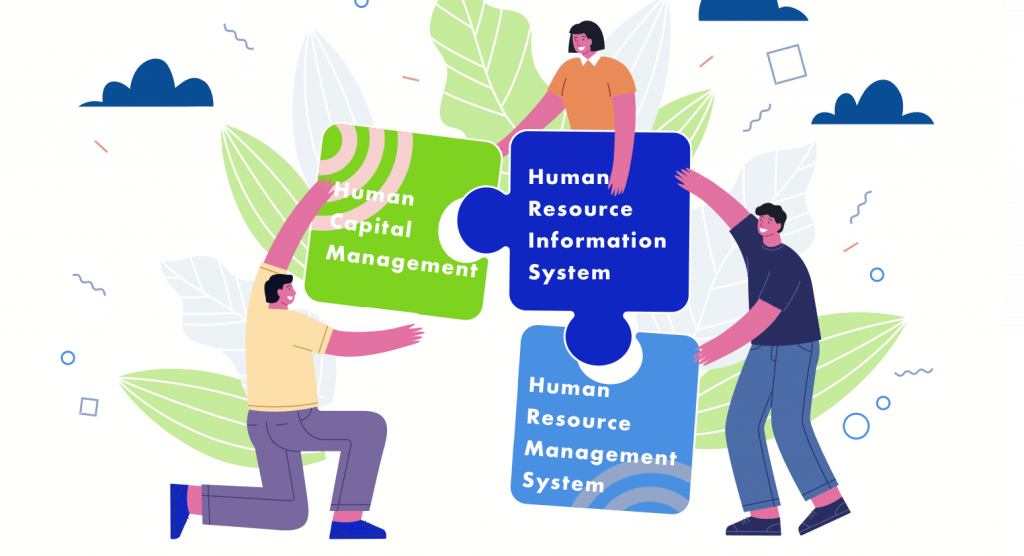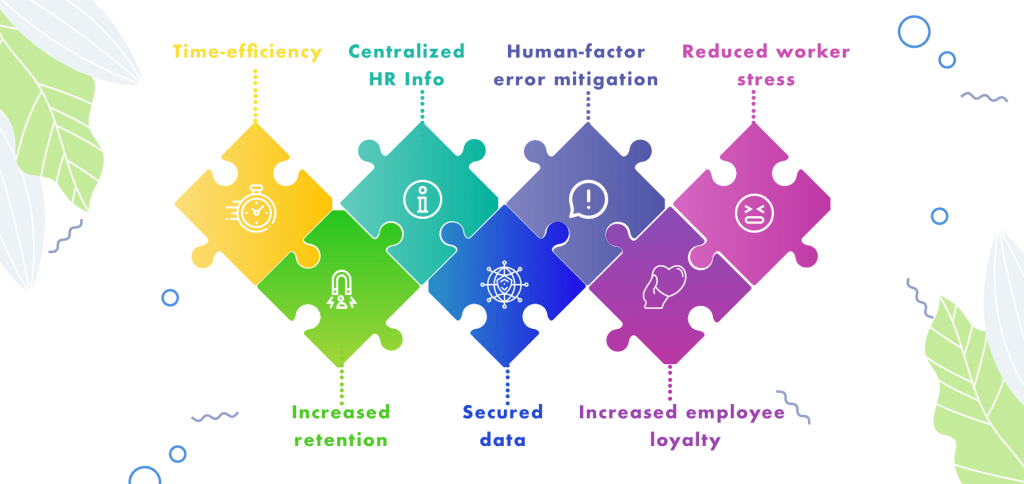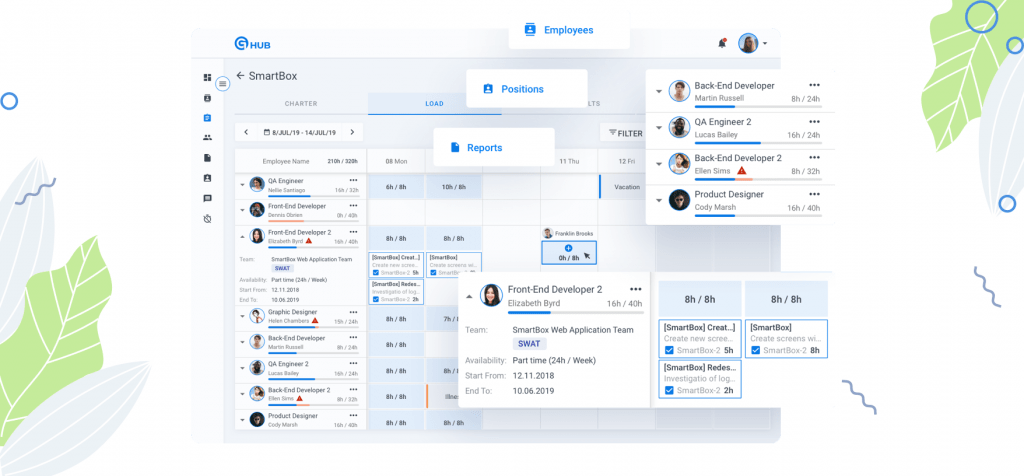Recently updated on January 8, 2025
Chaos can be of different tastes, and the chaos of managing employees is of particularly sour flavor. Monitoring time offs, managing payrolls and workloads, analyzing performance, and planning budgets is a headache incarnate. Fortunately, people have the software and the drive to make work easier, so there is always a possibility to develop a Human Capital Management System (HCMS), which can ease managers’ suffering, decrease employees’ frustration, and boost a company’s performance.
This article will guide you through the world of Human Capital Management System (or Human Resource Management), describe their types, functionality, and the benefits they provide. In addition, it will describe why it’s important to build human capital management software.

Contents:
4. Custom vs Out-of-the-Box HCMS
5. Conclusion
Types of HR Software
In essence, Human Resource Software is quite a broad concept used to describe systems that automate a variety of HR functions required to keep a company’s workforce up and running at a steady and efficient pace. Therefore, depending on their purpose and nature of performed tasks, HCMS are divided into three types for the sake of convenience:
Human Resource Information System (HRIS) — the most extensive system created to manage personnel. It includes all required features, such as managing of recruitment, onboarding process automation, performance analysis, payroll management, accounting, workload management, etc
Human Capital Management (HMS) — software created to automate an employee development process, which includes onboarding, performance analysis, and statistics. The software helps an HR manager to lead people to better career outcomes.
Human Resource Management System (HRMS) — software with the purpose to manage payroll, monitor employees’ journeys and time-offs and manage workload.

Keep in mind that the following categorization of Human Resource Management Software is not rigid. There are systems that can be hybrids, combining functionality from different types of systems, or be simply a part of the bigger ERP system.
On the contrary, we believe there is no need for complications, so you can simply use ‘HCMS’ or ‘HRMS’ to name a system that performs everything mentioned above. Because why settle for less if you can have more in the same package?
In addition, HCMS can be desktop-based, cloud-based, or web-based. The choice comes down to a company’s infrastructure and demands as well as a budget because each option has its pros and cons. Also, it is important to remember that the possibility to access HCMS using a mobile device is an extreme advantage that shouldn’t be neglected.
HCMS Functions
Human capital management enterprise system is a digital swiss knife of HR managers, and it can perform dozens of different functions depending on a company’s requirements and specifics. Here are universal, the most prevalent functions of a Human Capital Management System.
Monitoring and Managing Time Offs.
Let’s start with the most pleasant one — vacations, day-offs, business trips, sick leaves (ok, the last one is not so pleasant, but there is no escaping from illnesses). Who doesn’t love vacations? However, as it happens, the process of requesting, reviewing, and accepting or declining vacations can be a cumbersome and mind-numbing process. Therefore, every self-respecting human capital and knowledge management system should have Time Offs functionality to streamline the process and keep everything in neat order.
No more missing vacation requests, miscalculating the number of days left for requests and struggling to track one’s time off.
Payroll Management
From one pleasantry to another — salaries. Even though receiving payment for your job is a major satisfaction, conducting payments and managing payrolls — not so much considering the amount of associated work. Therefore, payroll management is among the most popular features of HCMS. Usually, it includes
– Salary/bonus management, which automates the process of paying wages and/or additional bonuses for good performance.
– Taxes management, which keeps the financial records and helps to pay taxes.
HR Info and Reporting
It is difficult to overestimate the convenience of having all the information about a company’s employees neatly arranged in one place. It also includes data on performance, which helps conduct performance reviews. In addition, a Human Capital Management System allows HR managers to create reports on employees’ performance from provided templates using information that is stored in the system.
Hiring Management
Nowadays, hiring is a complicated process with various stages, which require intricate approaches for maximum efficiency. Therefore, an HCMS can help to manage to create and post new vacancies, manage received applications, organize and conduct a recruitment process, and lead an applicant from the initial stages to a job offer.
Self-onboarding
The first days on a new job can be extremely frustrating. New environment, new colleagues, new work process and demands, unfamiliar tools and protocols — all this takes its toll on a newcomer’s mental well-being. Therefore, HCMS usually have onboarding features, which help mitigate the ‘pain’ of starting anew. The onboarding feature provides newcomers with easy access to all necessary information stored in whichever medium a company finds most appropriate.
Career Management
A human capital management system helps to manage a company’s talents and boost their career growth by helping them monitor and achieve long- and short-term goals, manage the development of their skills, monitor the loyalty of employees, and make informed career adjustments.
The mentioned functions of Human Capital Management Systems are just the tip of an iceberg. If you choose to design a custom human capital management system, it will have a significantly more impressive function created to fit a company’s specific needs and profile. So, what are the benefits of a human capital management system?
7 Benefits of HCMS

We think, you may have already guessed some, if not all, advantages of a decision to create a human capital management solution considering the vast functionality they grant. However, we sorted them out and wrote them down for you.
Here are 7 reasons why your business needs Human Capital Management Systems:
1. Time-efficiency. The rule of thumb is that the automation of cumbersome processes reduces the time employees spend on those processes.
2. Centralized HR Info. The absence of easy access to information is a source of misunderstandings and a lack of synchronization between departments. HCMS eliminates this problem.
3. Human-factor error mitigation. People are prone to making mistakes, out of inattentiveness, tiredness, or even personal biases. Proper software minimizes such a possibility.
4. Reduced worker stress. Automated onboarding, smooth HR guidance, timely salaries, and vacations help make employees more content.
5. Increased retention. Nothing helps to increase employee retention as much as a good salary and comfortable working conditions. And nothing speaks comfort more than a smooth HR management process, which helps to ensure that each worker is well-rested, appropriately paid, and happy doing their work.
6. Secured data. Properly secured HCMS will help ensure that the information is protected from people who should not have access to it as well as from malicious intentions and physical damage.
7. Increased employee loyalty. In the end, all of the mentioned above increases the chances that employees will like a company they work for much more.
Custom vs Out-of-the-Box HCMS
Often, the answer to the question, “Should we develop a custom Human Capital Management Software or choose an already completed, mass-market solution instead?” comes down to a prosaic issue of time and budget. The smaller the budget and tighter time-constraints, the more likely a company to choose an out-of-the-box HCMS. However, this issue is a little more complicated than that. A big budget and plenty of time do not automatically mean custom software. First of all, a ready-to-go HCMS for sale does not necessarily mean cheaper. As a company scales and the provider changes its pricing policy, the costs can increase significantly. Such a price fluctuation is difficult to predict. In addition, sometimes, a company simply does not want the hustle associated with the development of the custom software, finding a reliable tech partner to create the system, and supporting new infrastructure in the future.
In addition, mass-market HCMS can be an ideal temporary option used to fill in an existing gap while the alternatives are being researched and discussed.
Nevertheless, it would be right to mention that a decision to build an HCM System will never be a miss for a growing company. A custom-built solution is a perfect fit for a specific company’s needs. Such software will scale along with a company and will support its HR infrastructure on the deepest level, down to the tiniest nuances. Finally, building a custom Human Capital Management System will grant a company the privilege of independence from third-party providers.

Conclusion
Of course, a company can successfully exist without any Human Capital Management Systems. However, there is no going back once you tried using proper HR software because of the number of benefits and convenience the system grants. And the bigger the company grows, the more apparent the need for a good HCMS becomes.
Therefore if a company wants to boost its performance and streamline HR processes along with increasing workers’ satisfaction rates, HCMS can be the right answer.
Developing a custom HRM system or paying for an out-of-the-box solution depends on a company’s needs and profile as each option has its pros and cons.
Lucky for you we can provide you with both. On one hand, we developed GeekHub, which is a simple management system for service companies of any size. It is designed to automate the management of people, finance, operations, and projects by using the industry’s best practices.
On the other hand, if you require a custom HCMS solution, we are well-versed in developing different software of all sorts for companies of different sizes, from startups to enterprises. Our expertise spans several industries and most popular technologies from desktop to mobile and cloud-based solutions. You can check our portfolio here and customer reviews here.
Contact us, if you are interested.

